Chatbase vs Intercom Fin: The Best AI Chatbots? (2025)
Chatbase is the affordable, custom-trained option, while Intercom Fin delivers advanced AI and deep integrations at a much higher price.
This guide is designed to help you quickly decide which chatbot platform best fits your needs.
Inside, you’ll find a side-by-side overview, comparison of features, pricing, integrations, AI capabilities, customization, customer reviews, pros and cons, and a clear summary of who should choose each tool.
Let’s dive in 👇
Should you consider Big Sur AI instead?
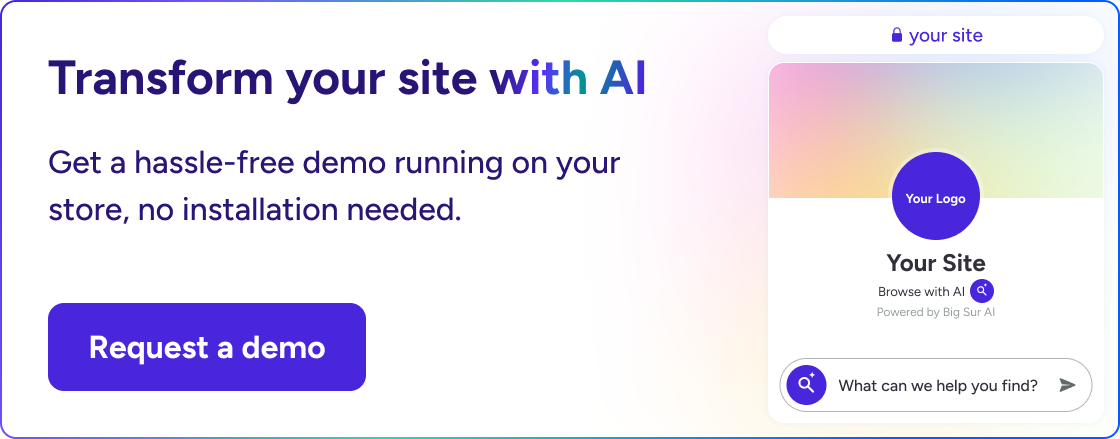
Reason 1: No setup, instant launch
Instead of spending hours uploading docs or manually training a chatbot, Big Sur AI comes with ready-to-go, industry-specific bots. Real estate agencies, SaaS startups, or e-commerce teams can launch live support for FAQs, onboarding, and scheduling in minutes.
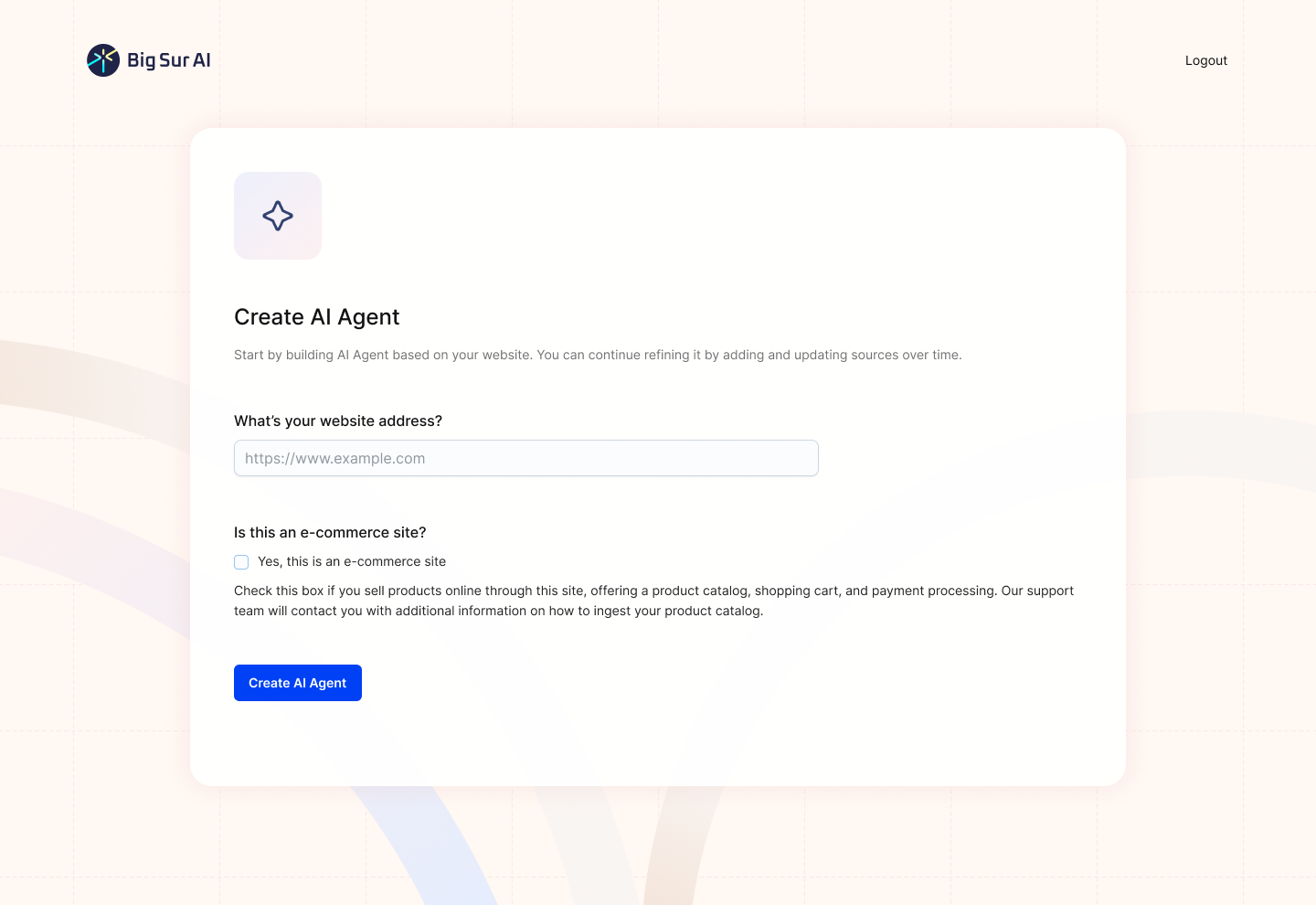
Reason 2: No tech headaches or developer dependencies
Big Sur AI eliminates API wrangling, webhook setup, and third-party integration work. Teams with no IT resources can simply add Big Sur AI to their site and start solving user questions instantly, without risking future technical debt.
The chatbot will automatically scan your documentation and website data to deliver highly accurate responses to complex questions.
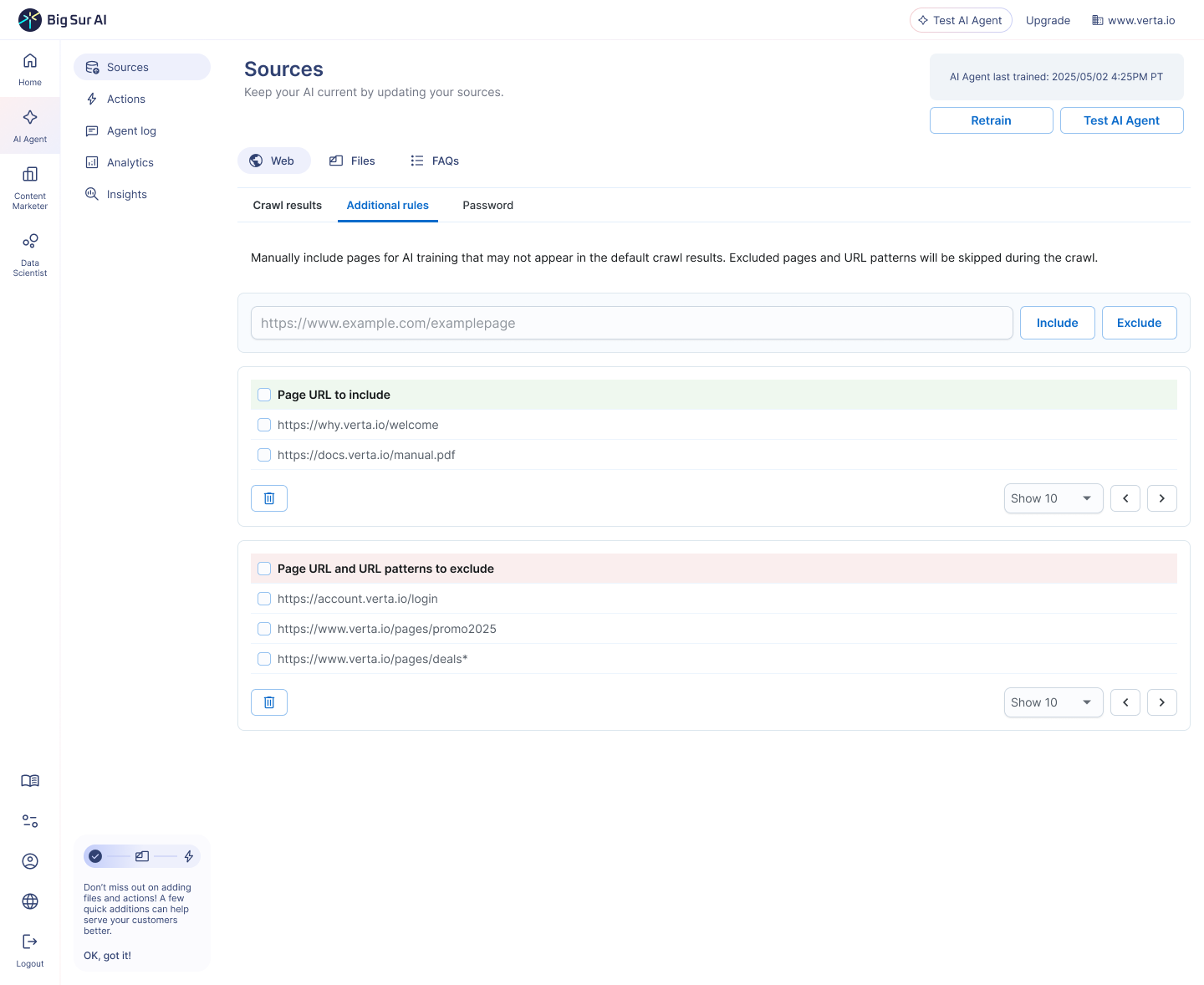
Reason 3: Predictable, flat-rate pricing with no surprise costs
Unlike Chatbase’s message tiers or Intercom Fin’s per-resolution billing, Big Sur AI uses a single monthly price regardless of chat volume. This makes budgeting straightforward even during high-traffic product launches or busy support periods.
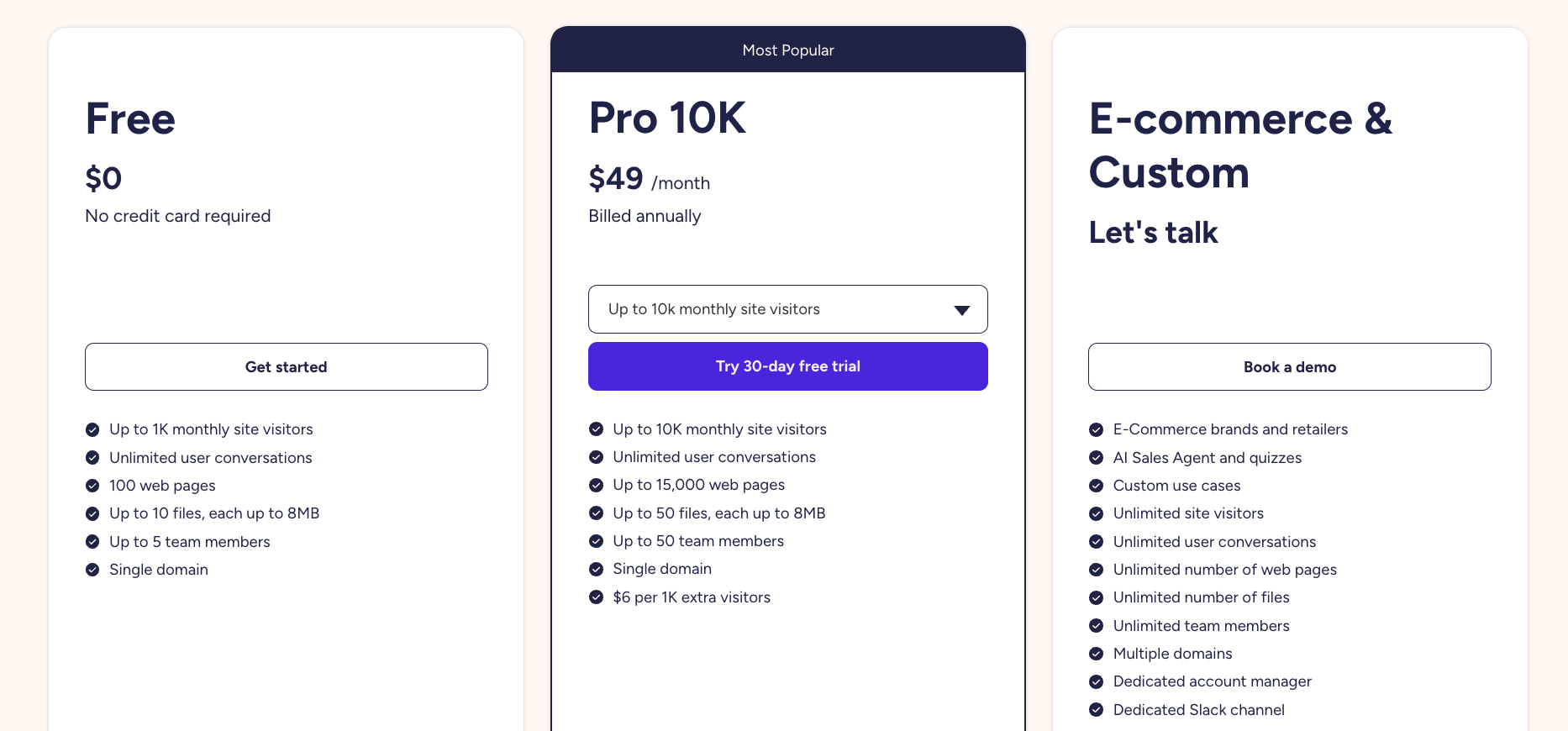
Reason 4: AI workflows
Big Sur AI can do more than respond to user queries. It can automatically create website landing pages based on your product content, or power AI automations that act as background agents when specific criteria are met.
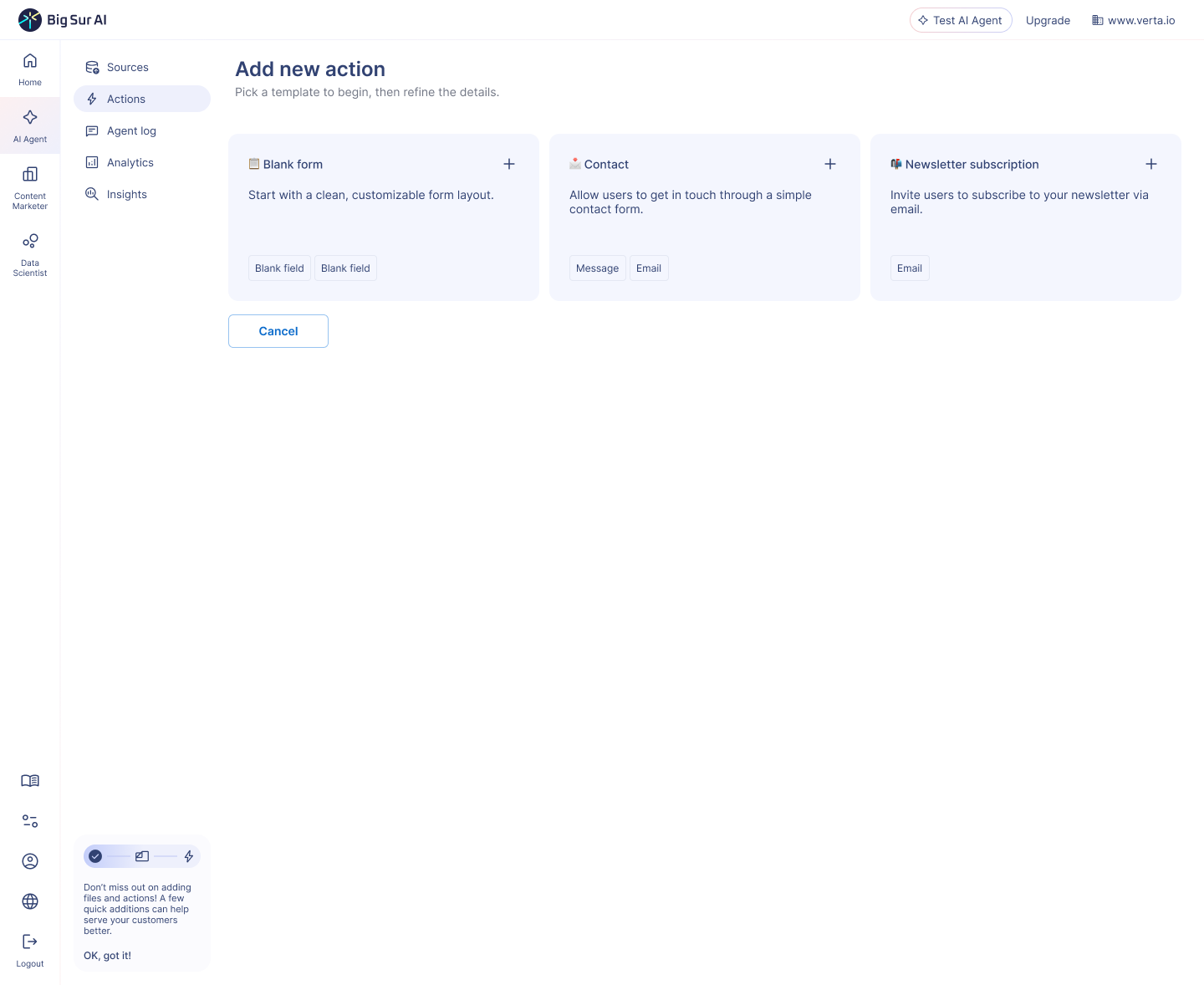
Chatbase vs Intercom Fin: Overview
| Factor | Chatbase | Intercom Fin |
|---|---|---|
| Public reviews | 4.3 ⭐ (G2), 4.6 ⭐ (Capterra) | 4.7 ⭐ (G2), 4.5 ⭐ (Capterra) |
| Our rating | 8/10 ⭐ | 8.5/10 ⭐ |
| Core purpose | Affordable, easy-to-deploy chatbot trained on your own data | Enterprise-grade AI support automation with advanced integrations |
| Best for | SMBs, agencies, startups, content-driven businesses | Large businesses, SaaS, support teams needing platform depth |
| Typical use cases | Website Q&A, docs bots, custom data chatbots, lead gen, customer support | Customer support automation, ticket triage, CRM/support workflow automation |
| Hosted vs self-hosted? | Hosted (SaaS) | Hosted (SaaS) |
| Open Source? | ❌ No | ❌ No |
| Pricing model | Monthly subscription, tiers based on chatbot/data volume | Monthly subscription (usage-based, conversation volume); requires Intercom subscription |
| Free plan? | ✅ Yes (basic limits) | ❌ No (paid add-on to Intercom only) |
| Customization level | High (custom training docs, website/data upload, no-code fine-tuning) | Medium (custom responses, workflows, but less training on own data) |
| Ease of use | Very easy (no code, plug-and-play, UI focused on fast onboarding) | Moderate (enterprise UI, more settings, learning curve but powerful) |
| LLM integrations | OpenAI GPT-3.5/4, Google PaLM, Azure OpenAI (configurable) | OpenAI GPT-4 (primarily), Intercom's own fine-tuned pipeline |
| Other integrations | Webhook, Zapier, widget embed, API access (depends on plan) | Deep: CRM, helpdesk, Intercom inbox, Slack, analytics, workflow builder |
| Workflow capabilities | Basic conversation flows, FAQ/knowledge retrieval, redirect to humans | Advanced automations, ticket routing, third-party actions, reporting/analytics |
| Deployment options | Website widget, iframe, API | Website widget, mobile apps, native within Intercom |
| Team collaboration | Team invites, admin controls (higher plans) | Advanced—roles, permissions, routing, Intercom team inbox |
| Pros |
✅ Very affordable ✅ Fast & easy custom training ✅ No-code setup ✅ Fine-tuned to your docs ✅ White-label (biz plan) |
✅ Most accurate AI support answers ✅ Seamlessly integrated with Intercom ecosystem ✅ Powerful analytics, enterprise features ✅ Advanced routing/automations |
| Cons |
❌ Lacks deep integrations ❌ No self-hosting ❌ Limited enterprise workflow ❌ Can reach limits on lower tiers |
❌ Expensive (add-on + Intercom subscription required) ❌ Locked to Intercom platform ❌ Limited custom training on own data ❌ No open/free plan |
| Why choose it? | 👉 Best if you want a no-code, custom-trained AI chatbot for your own site, at the lowest cost | 👉 Best if you need enterprise-grade AI automation deeply tied to your Intercom-based support stack |
Chatbase vs Intercom Fin: How do their features compare?
Chatbase is more affordable and budget-friendly
Chatbase stands out for teams that want to deploy an AI chatbot without breaking the bank. Its pricing scales down for startups, small businesses, and solopreneurs, while Intercom Fin comes at a premium, starting at hundreds per month and quickly increasing if you expand usage.
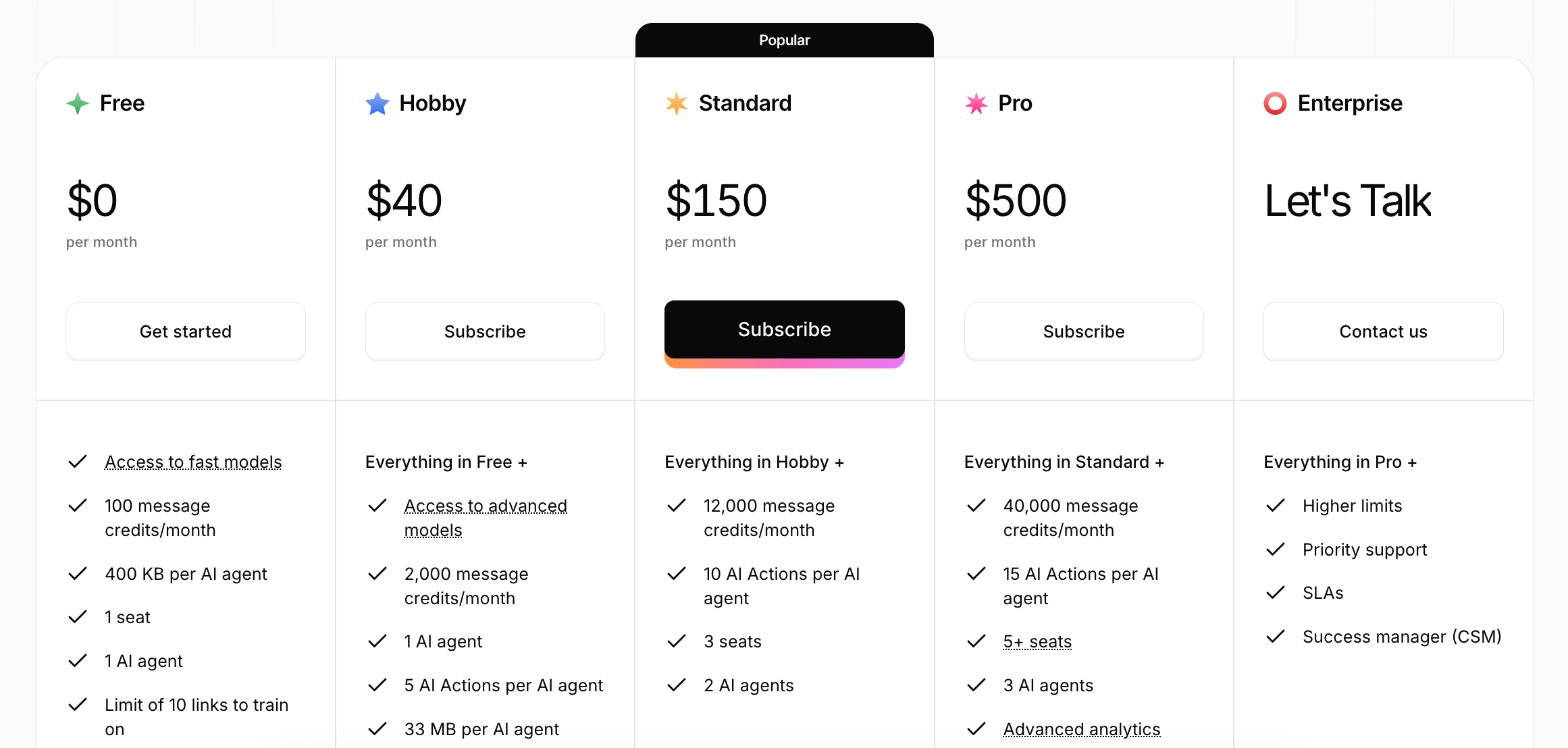
For example, businesses launching their first knowledge base chatbot can do so affordably with Chatbase, while Intercom Fin’s fees typically make sense only for larger companies with complex needs.
Intercom Fin outpaces Chatbase on native integrations
Fin has a deep advantage when it comes to connecting with core business systems. Intercom’s Fin is tightly connected to the Intercom ecosystem, enabling things like CRM record pulls, real-time ticket escalation, and automatic lead routing from live chat to sales or support pipelines.
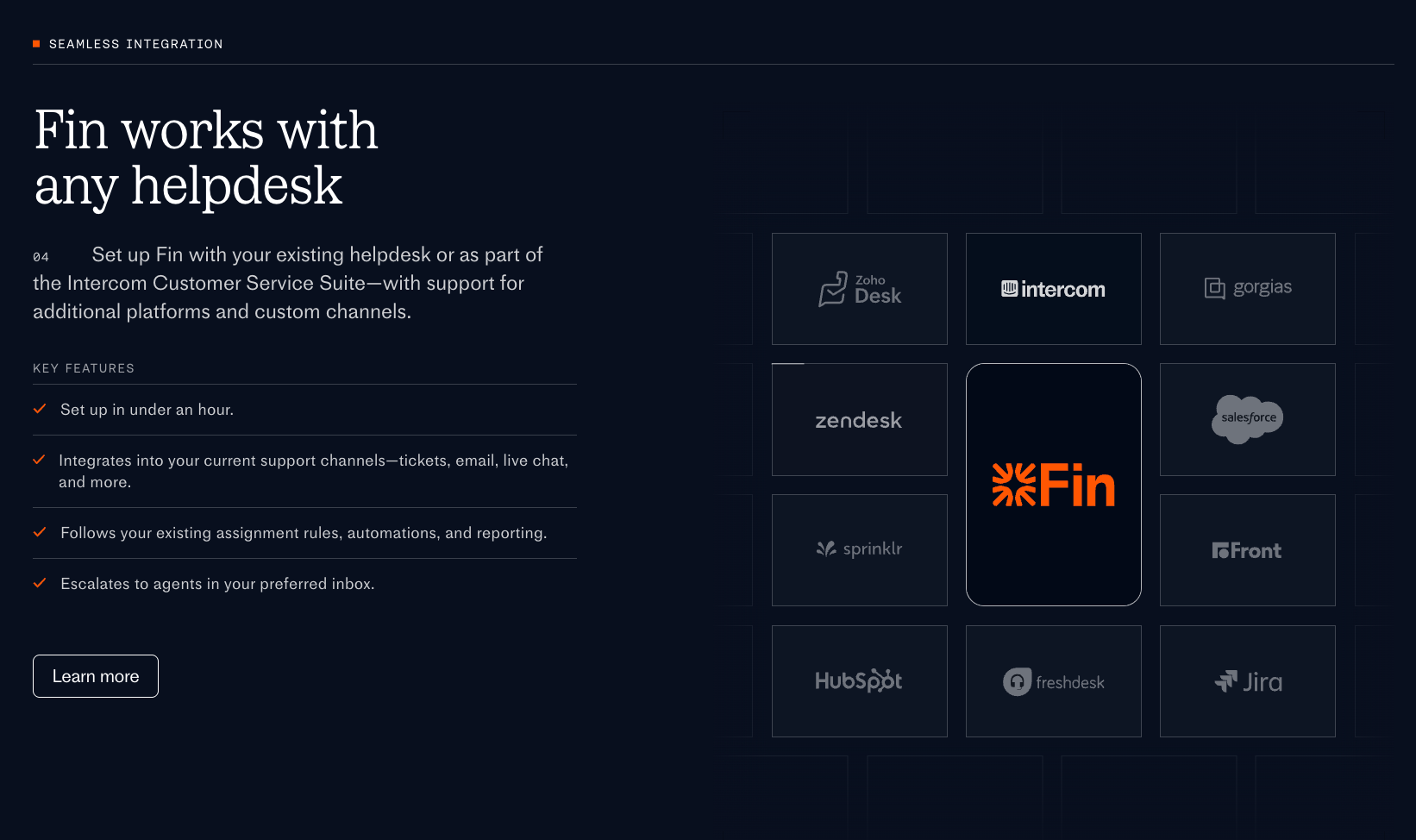
Chatbase integrates via API, but out of the box, it can't match Fin’s native connections to platforms like Slack, Salesforce, or Zendesk for automating agent handoffs or pushing customer data directly to your other tools.
Chatbase wins on custom data training and control
If having your chatbot provide answers strictly based on your own docs is crucial, Chatbase leads. Upload your knowledge base, PDF manuals, or data files, and Chatbase’s engine will only answer based on what you upload. This gives you granular control over what your AI can and cannot say (useful for compliance-heavy industries).
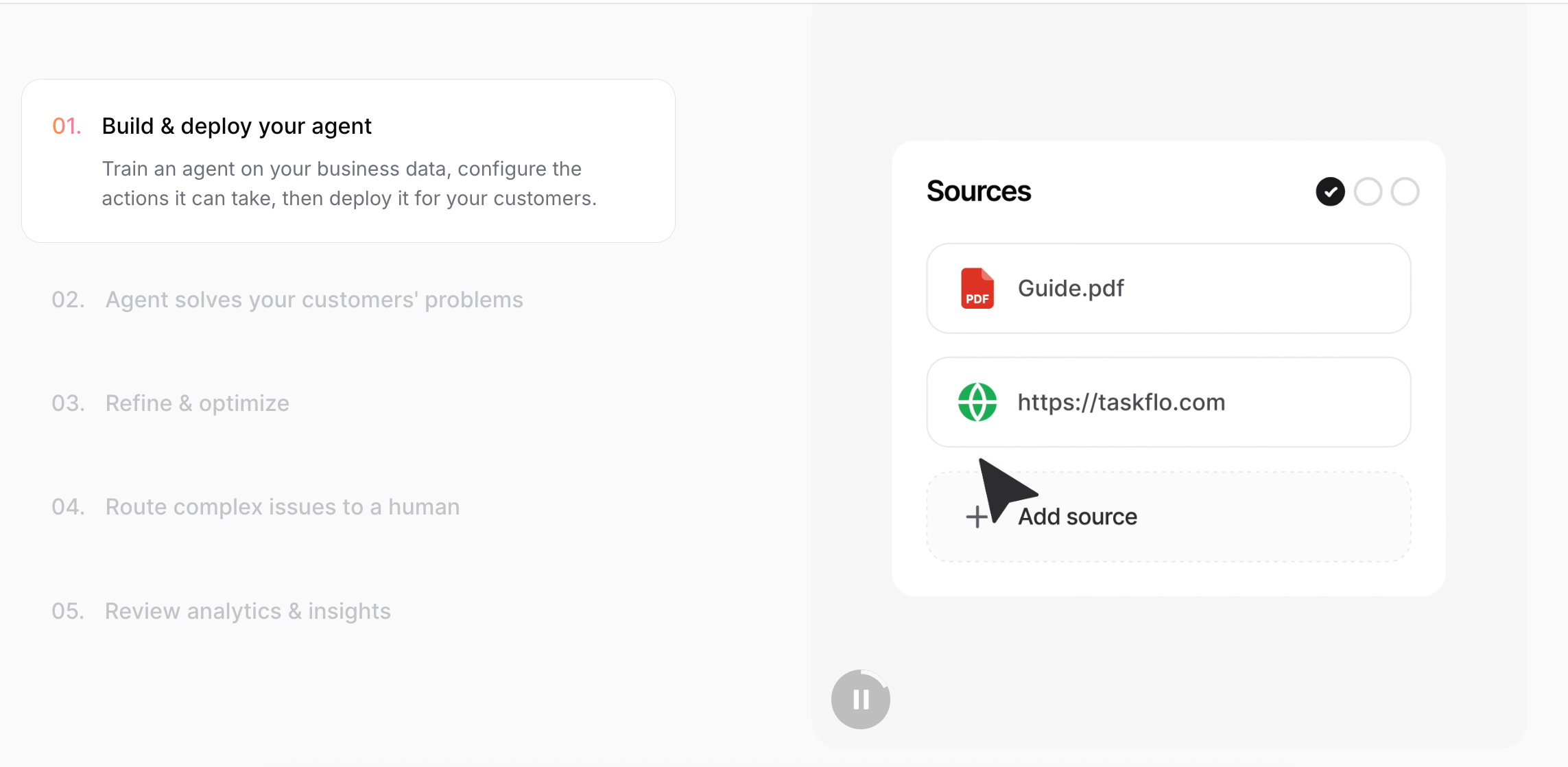
By contrast, Fin draws from global information and its broader foundation model, with custom data influencing but not strictly defining its answers—sometimes introducing off-script information.
Intercom Fin has the edge on advanced AI and language handling
Fin leverages OpenAI’s most advanced models, which show clear benefits with ambiguous, complex, or multi-step queries. Intercom Fin’s conversations often feel more “human,” picking up on subtle customer intent and following up with context-aware questions or clarifications when the initial request is unclear.
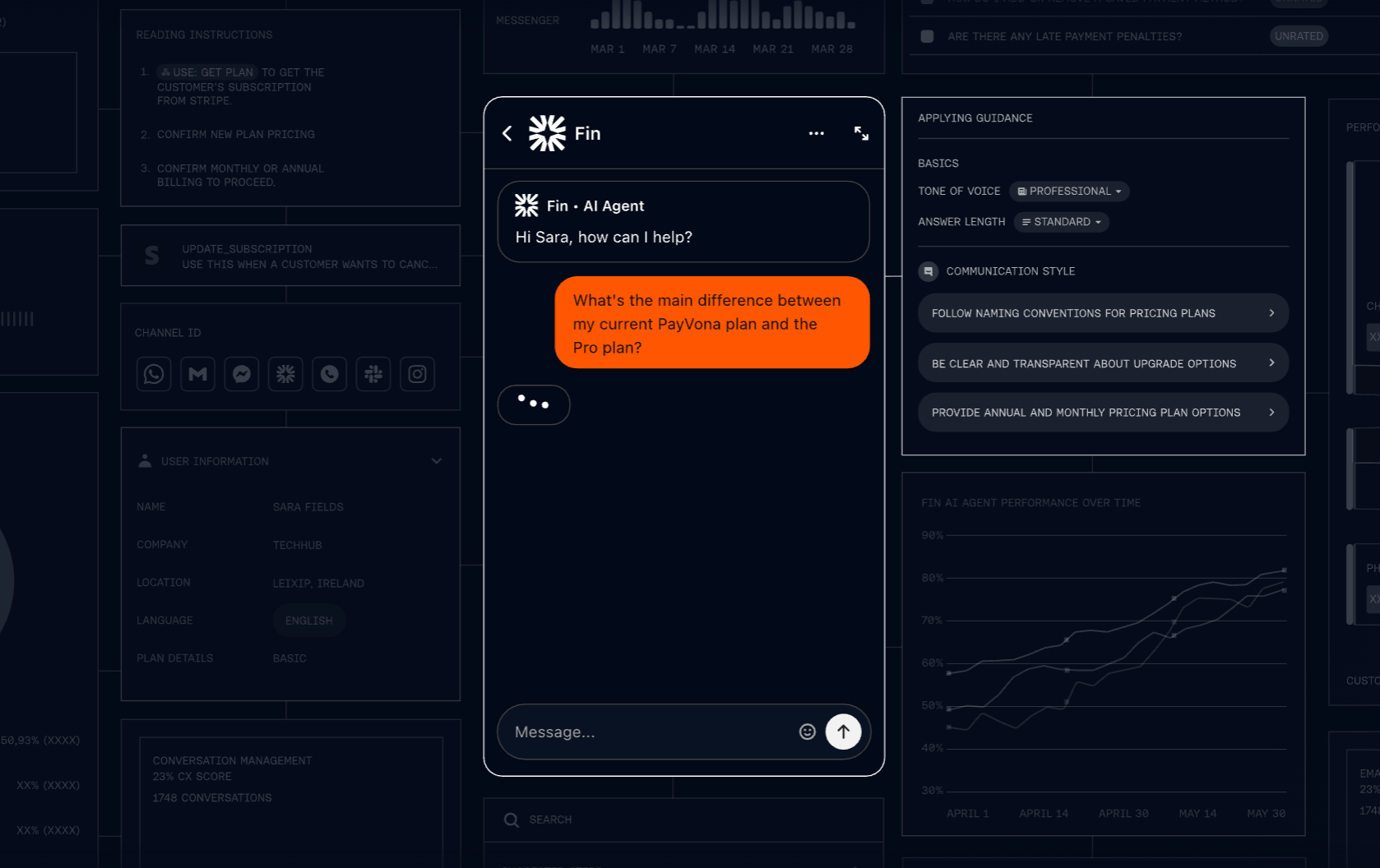
Chatbase is effective for straightforward Q&A but sometimes struggles if customers put questions in unusual phrasing or require deep context tracking.
Chatbase is more flexible for white-labeling and embed options
With Chatbase, you can fully rebrand your AI assistant—removing Chatbase logos, customizing chatbot colors, and embedding it on any web page or inside apps with ease. This flexibility is particularly valued by agencies or product teams reselling chatbot solutions.
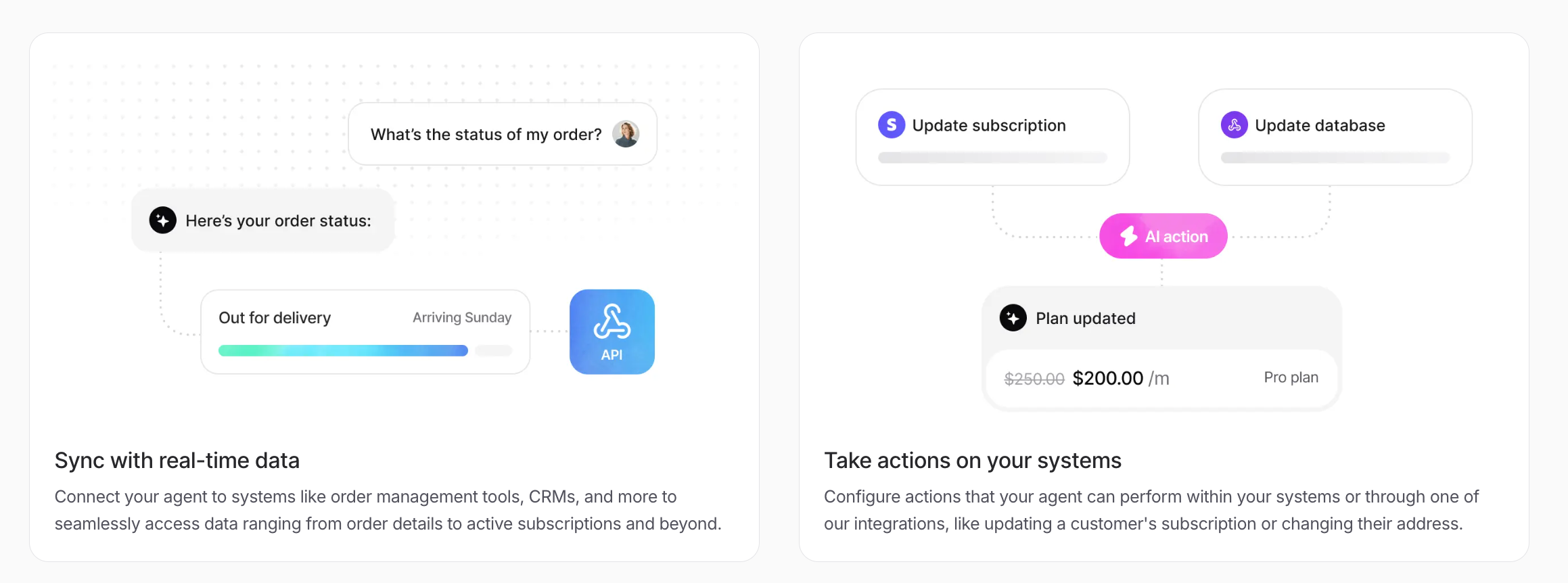
Fin’s chatbot lives within Intercom’s widget, so the look and feel must stay within permitted customization boundaries, and white-labeling is limited.
Intercom Fin is more favored by enterprises needing robust analytics and compliance
Fin offers granular reporting on chatbot performance, including unresolved queries, time saved for human agents, and CSAT impact—displayed in real time. It also meets strict enterprise compliance and security requirements (SOC2, GDPR, HIPAA-ready options), with dedicated onboarding and support.
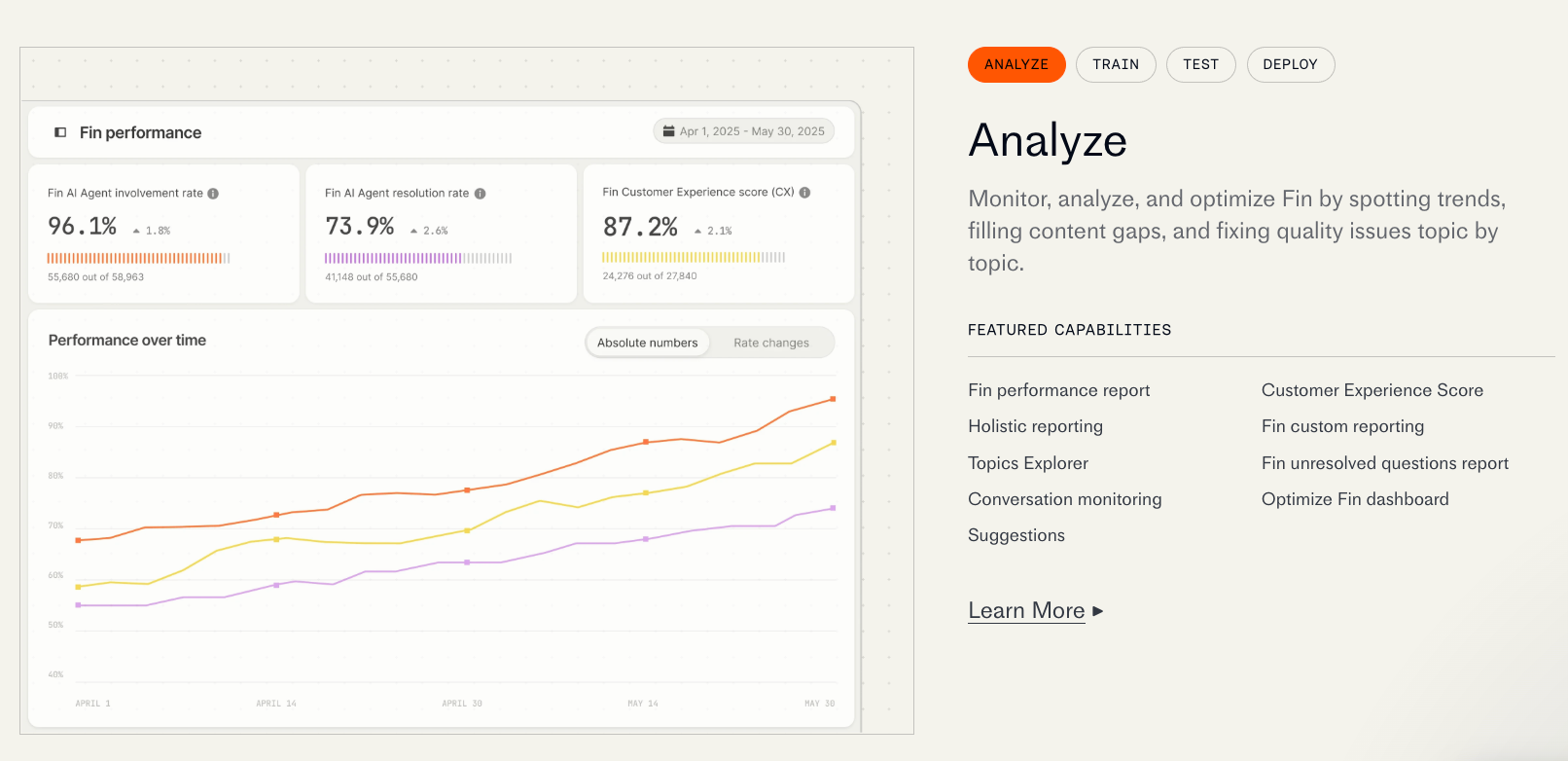
Chatbase offers usage stats but doesn't reach the same level of analytics or guarantee the compliance features enterprise buyers often demand. For regulated industries or high-volume support, Fin’s analytics and compliance advantages are hard to overlook.
Chatbase vs Intercom Fin: How much do they cost?
Chatbase's pricing: quick overview
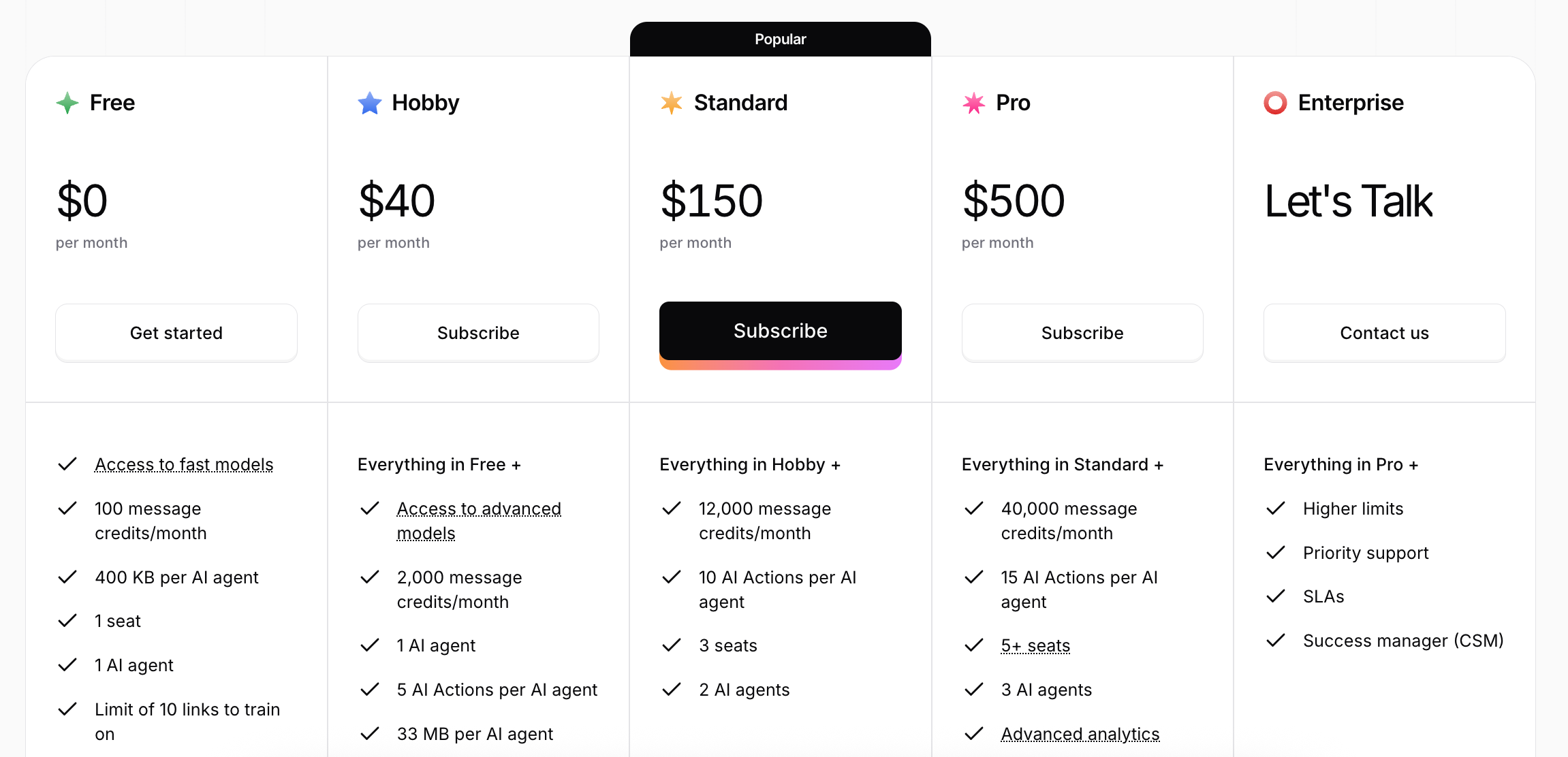
- Pricing tiers:
- Hobby: $19/month (2,000 messages/month)
- Standard: $49/month (10,000 messages/month)
- Pro: $99/month (40,000 messages/month)
- Business: $399/month (200,000 messages/month)
- Each plan includes unlimited bots and data sources
- Overage charges: Additional messages billed per 1,000 block
- White-label and API access require higher-tier plans
Intercom Fin's pricing: quick overview
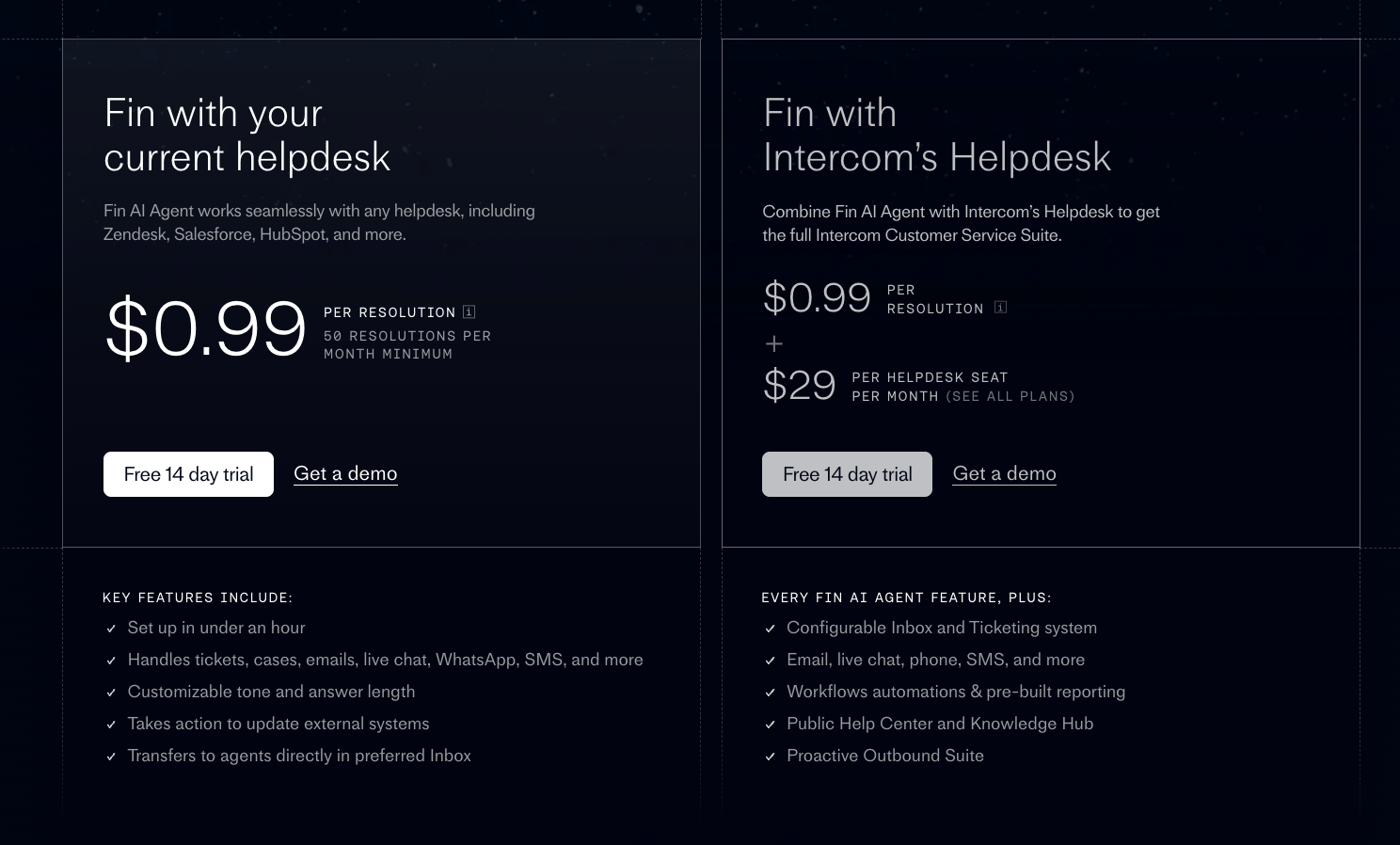
- Core Fin AI bot: $0.99 per resolution (a completed conversation)
- Requires a paid Intercom workspace (starting around $39/month, not included in Fin pricing)
- No preset plans — you pay strictly for each resolution handled by Fin
- Custom add-ons for advanced AI integrations, support tiers, and automation
Key differences between each pricing structure
- Chatbase: Subscription-based with message limits per month
- Intercom Fin: Usage-based; pay per successful AI resolution, plus required Intercom workspace fee
- Chatbase plans offer predictable monthly costs, while Intercom Fin's pricing scales directly with your actual usage
How generous are each free plans?
- Chatbase: Free plan gives 20 message credits/month, 1 bot, and limited customization
- Intercom Fin: No free plan for Fin. Requires paid Intercom account to activate Fin
How does pricing increase with heavy usage?
- Chatbase:
- Per 1,000 extra messages is $4–8 depending on plan
- Upgrade to higher tiers for better message rates
- Intercom Fin:
- Every successful AI resolution is $0.99, no discounts at scale
- High-volume support teams can see costs rise sharply, especially if most interactions are resolved by AI
Other potential surprises
- Chatbase: API and white-labeling are only on higher-paid plans
- Intercom Fin: Final price depends on both Intercom subscription (required for Fin access) and per-resolution charges
- No pricing controls for unexpected spikes in resolution volume; watch your settings to avoid surprises
Here’s a quick cost/profile snapshot:
| Tool | Best For | Key Strength | Drawbacks | Pricing |
|---|---|---|---|---|
| Chatbase | SMBs, marketers, content-heavy sites | No-code, fast custom training, white-label options | Message/training caps, slow data syncing, false positives in answers | Hobby: $19/mo; Standard: $49/mo; Pro: $99/mo; Business: $399/mo |
| Intercom Fin | Scaling SaaS, advanced automation, existing Intercom users | Deep integration, rich analytics, enterprise-ready, handles complex flows | No standalone pricing, can get expensive, strict per-resolution billing | $0.99/resolution (+ Intercom subscription) |
Both tools have clear strengths, but their pricing models fit different business realities.
Chatbase vs Intercom Fin: Integrations & workflows
Integration options
Chatbase offers a simple API and ready-made integrations for website builders and platforms like WordPress, Shopify, and Webflow. Embedding the chatbot is straightforward, typically involving a code snippet or plugin. Integration with business workflows is limited but suited to small and medium websites needing fast deployment.
Intercom Fin (Competitor) integrates deeply with existing Intercom environments. It connects with your support suite, CRM, and ticketing systems out of the box. Fin supports custom automations through Intercom’s workflow tools, making it ideal for businesses already invested in Intercom’s ecosystem.
Workflow automation
Chatbase centers on FAQ handling and document Q&A. Workflows are basic but sufficient for routing queries or surfacing relevant information. Most automation comes from custom prompt setups rather than complex drag-and-drop workflow designers.
Intercom Fin stands out with advanced workflow automation. It lets you build multi-step flows, trigger actions based on customer intent, and access customer data throughout each chat. Fine-grained control is available through Intercom’s visual workflow editor and APIs.
Chatbase vs Intercom Fin: AI capabilities
Chatbase and Intercom Fin both offer robust AI chatbots, but their focus and strengths are distinct. Here’s how their AI capabilities compare:
- Chatbase:
- Uses GPT-based models
- Fast and intuitive custom training using your own data, website, PDFs, or even Notion docs
- No-code setup for creating and refining the bot’s knowledge base
- White-label options and full brand control over your AI’s responses
- Basic analytics and moderate context awareness
- Limited integrations beyond messaging platforms
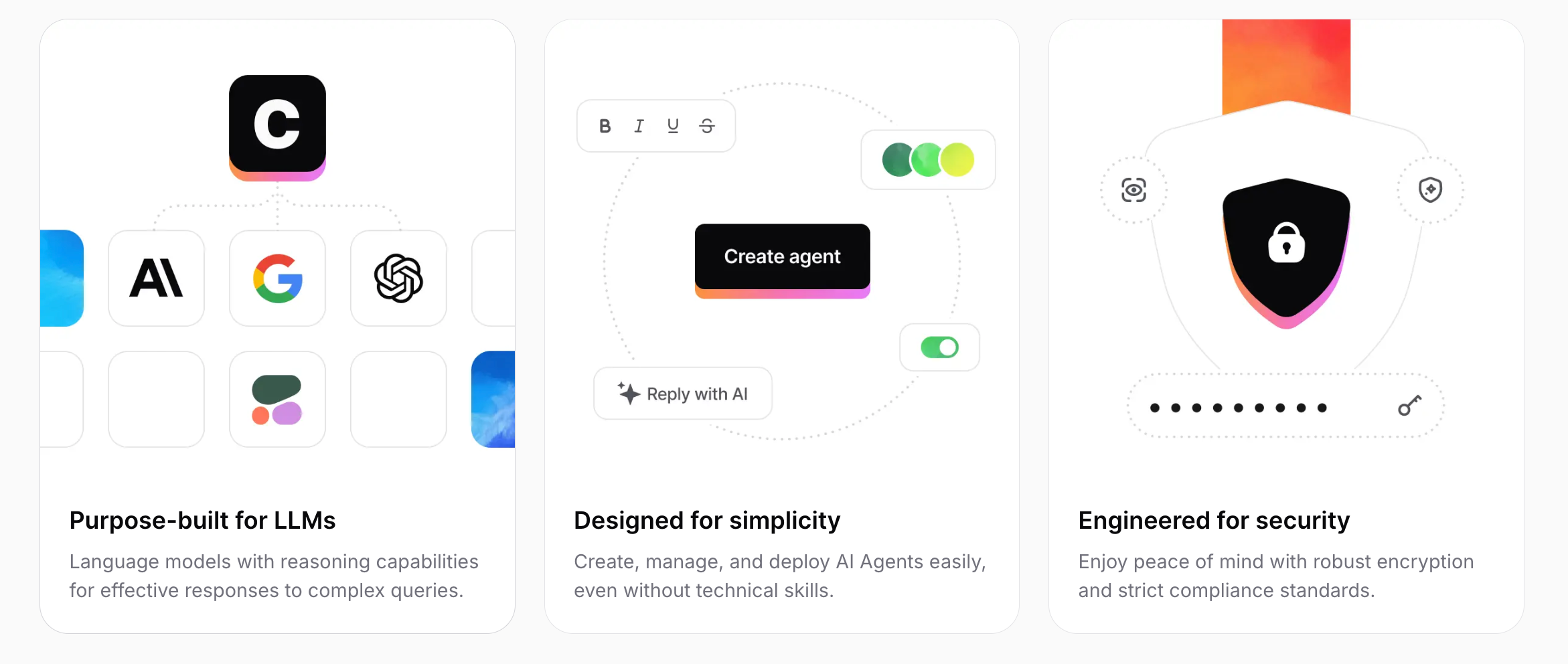
- Intercom Fin:
- Built on GPT-4, with enhanced AI for understanding complex customer queries
- Deep integration with Intercom suite for CRM, ticketing, self-serve support, workflows, and human handover
- Advanced context retention and memory for longer, more dynamic conversations
- Natural language understanding, intent detection, and multi-turn dialogue management
- Custom rules, conversation routing, and enterprise-ready security/compliance
- Advanced analytics, feedback loops, and continuous model improvement
| Tool | Best for | AI capabilities | Integrations | Key difference |
|---|---|---|---|---|
| Chatbase | SMBs, marketers, teams wanting affordable custom AI chatbots | No-code custom training, GPT-based. Fast bot creation from docs, URLs, or text, easy brand voice tweaks, basic conversation context | Web, web chat widgets, messaging apps | Affordable, simple, highly customizable AI trained on your data |
| Intercom Fin | Enterprises, high-volume support, businesses with legacy systems | GPT-4 powered, advanced context retention, enterprise-level NLU, built-in feedback learning, multi-turn management | Deep Intercom CRM, ticketing, self-serve portals, automation, analytics | Premium AI, tightly woven into broader support ecosystem |
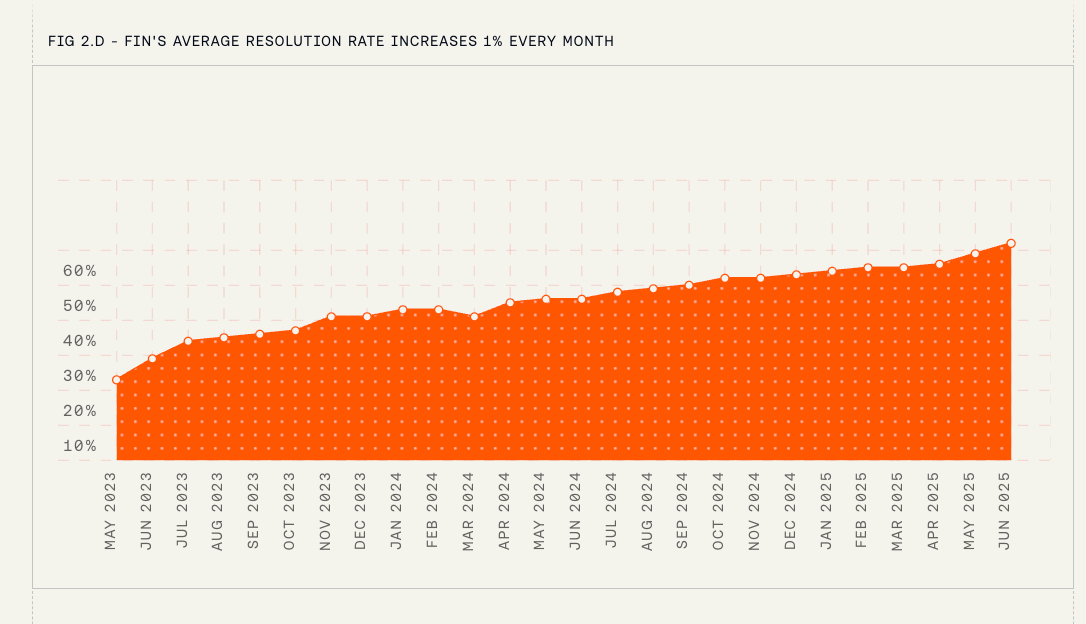
Bottom line:
Choose Chatbase if you want speed, affordability, and control over how your AI bot is trained. Opt for Intercom Fin if deep AI capabilities, advanced workflow automation, and robust integrations matter more than price.
Chatbase vs Intercom Fin: How customizable are they?
Custom training and data control
Chatbase stands out for its simplicity and control. You can upload your own documents, connect databases, or add URLs to train the bot on your unique data. This gives you direct influence over what the chatbot knows and how it responds. Training new knowledge is fast and straightforward, and you get full visibility into the knowledge base.
With Intercom Fin, training is tied closely to your Intercom workspace data. While you benefit from deep integrations with your support articles and historical chat data, adding custom or external data sources is more complex and less hands-on than Chatbase’s drag-and-drop approach.
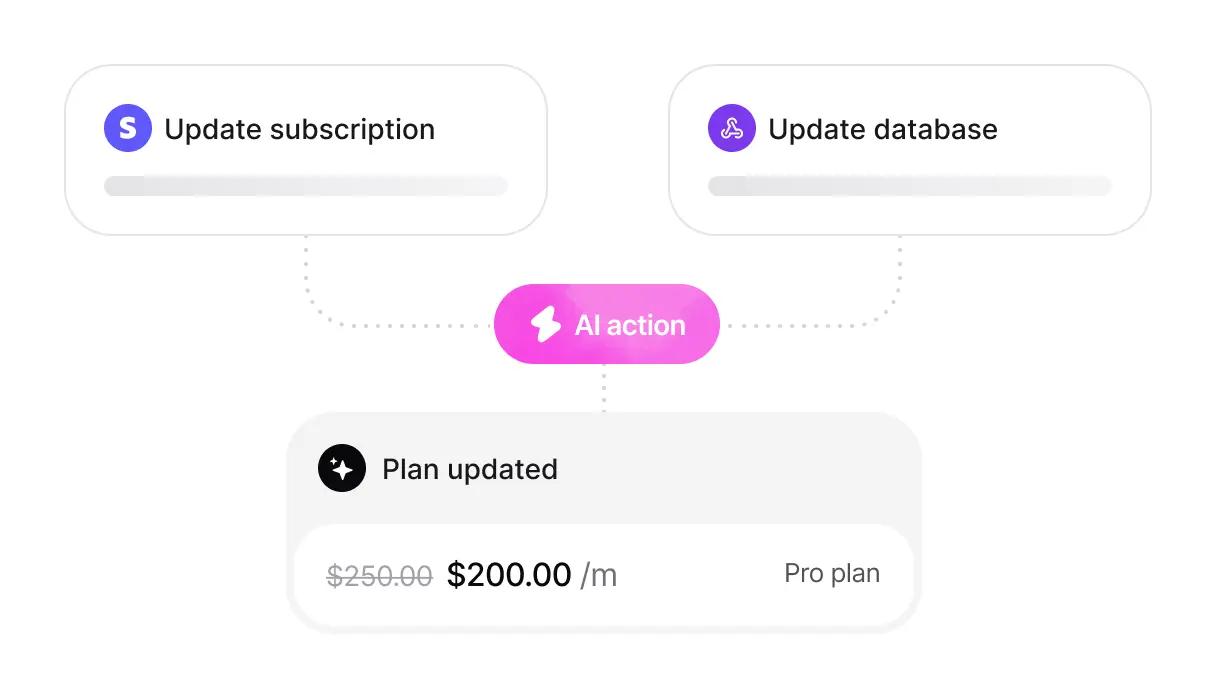
Branding and UX customization
Chatbase offers strong widget customization for look and feel—change colors, button styles, and chatbot avatars to align with your brand. You can adjust bot tone and fine-tune prompt settings, making it suitable for startups and businesses seeking a branded chat experience.
Intercom Fin is embedded directly into the Intercom Messenger, so you’re limited to the styling options Intercom provides. The messenger looks and feels professional, but heavy customization is restricted mainly to what's available in the Intercom environment.
Integration and workflow flexibility
Chatbase is API-friendly and works as a standalone chatbot on any website with a script. It integrates with common tools using Zapier, but does not offer native CRM or helpdesk features—you manage those connections yourself.
Intercom Fin excels if you’re already using Intercom for support or sales. Its integration with the broader Intercom ecosystem means seamless handoffs between bot, humans, and ticketing. However, this deep integration is one reason Fin is significantly more expensive.
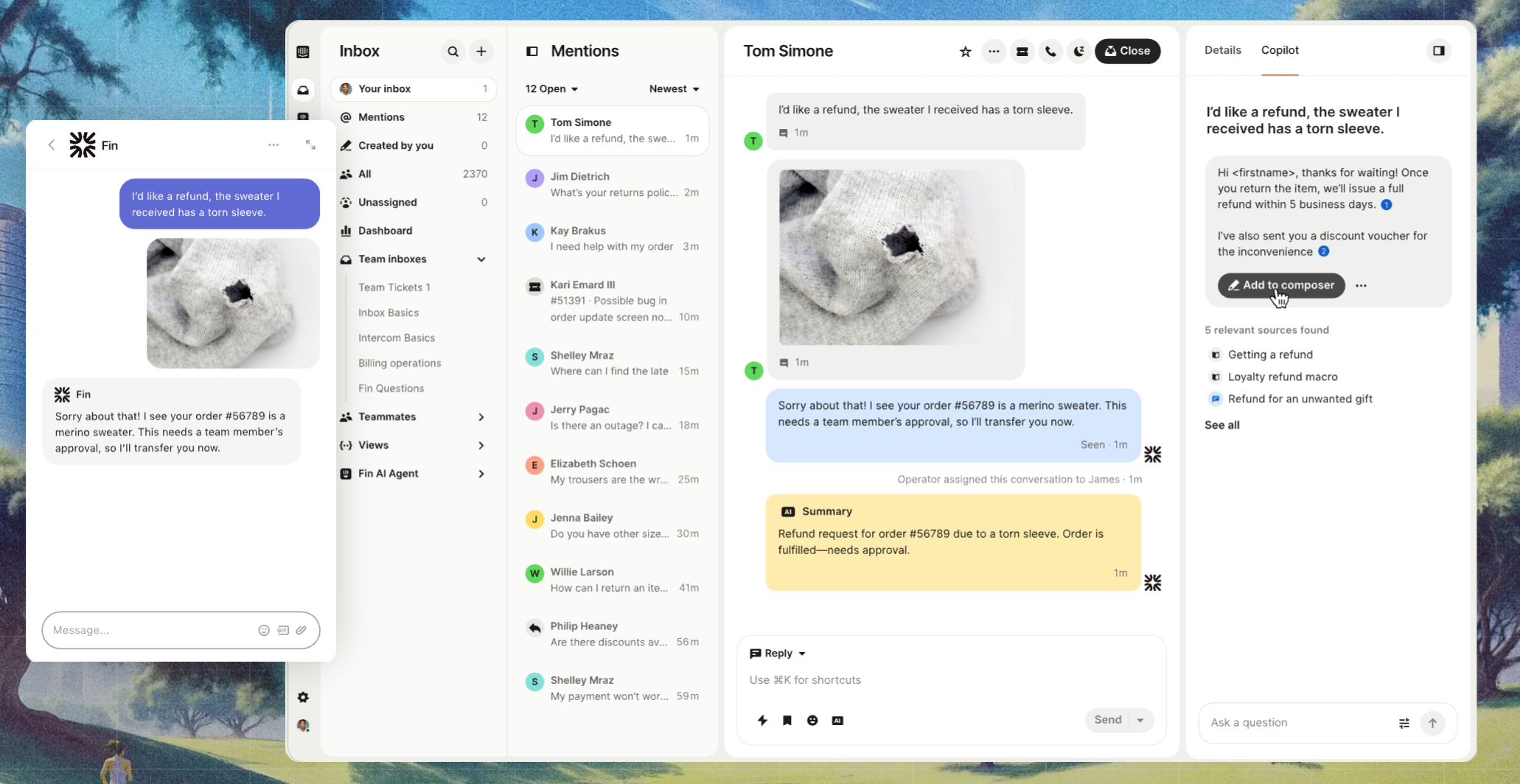
Chatbase vs Intercom Fin reviews: What do customers say?
TL;DR
Chatbase is loved for being affordable, easy to set up, and allowing teams to custom-train bots on their own data. However, some users point out limited features and integrations. Intercom Fin wins praise for its robust AI performance, seamless integration with the broader Intercom suite, and powerful support automation, but many consider it expensive and sometimes too complex for smaller teams.
Here are their respective major review site scores ⤵️
Chatbase’s G2 score: 4.6/5 ⭐
Chatbase’s Product Hunt score: 4.9/5 ⭐
Intercom’s G2 score (includes Fin): 4.5/5 ⭐
Intercom Fin’s TrustRadius score: 8.8/10 ⭐
Let’s break down what customers call out as good and bad about each tool👇
Chatbase: The good
Many users highlight Chatbase’s cost-effectiveness and customization options:
"Chatbase was simple to set up and let me upload my own documentation to train the chatbot. Our costs are a fraction of what we'd pay for Intercom."
Customers mention a quick learning curve and responsive support for troubleshooting issues. Reddit threads often point to the high value for startups, with comments like:
"For small businesses or SaaS startups, Chatbase gives you almost everything you need without insane pricing models."
Chatbase: The bad
Some reviews call out that Chatbase is missing more advanced automations and integrations:
“It’s affordable, but at some point you’ll wish it connected directly with more CRMs or ticketing tools.”
On Reddit and forums, the main negative themes are about limitations customizing the bot’s interface or handling more complex, multi-turn conversations. Others mention the documentation could be improved to help users get the most out of their bots.
Intercom Fin: The good
Almost all positive reviews rave about advanced AI and how deeply Fin connects with the rest of the Intercom platform:
"Intercom’s Fin gives us an AI agent that just ‘gets’ our customer queries—it connects ticketing, chat, and knowledge base, and triages support way faster."
Integrations with existing workflows (support, sales, and marketing) is a recurring highlight, especially for Intercom customers:
"Fin feels like a native part of the Intercom experience. The data the bot pulls in matches up with our existing support pipelines. This just works."
Intercom Fin: The bad
Intercom Fin’s main downside is price and complexity:
"Our team trialed Fin, but the pricing jumped up quickly if you actually want to use it at scale."
Some smaller and mid-sized teams find the broad feature set overwhelming and hard to justify unless already committed to the broader Intercom ecosystem:
“It’s overkill for what we needed; unless you’re deep into Intercom already, Fin might be more bot horsepower (and expense) than you need.”
Customers also mention needing more setup guidance when first launching Fin.
In summary, Chatbase wins for affordable, custom-trained chatbots, especially for SMBs and teams wanting quick setup. Intercom Fin is stronger for advanced AI and deep integration—but carries a steeper price and learning curve for smaller teams.
Chatbase vs Intercom Fin: Pros and Cons for each
TL;DR: If you need a cost-effective, easy-to-train chatbot that runs on your unique business content, Chatbase is the clear choice. If your team needs robust AI functionality, enterprise-grade analytics, and seamless integrations—and budget isn’t a blocker—Intercom Fin delivers advanced capabilities.
💸 Chatbase is ideal for businesses prioritizing affordability and custom-trained bots for tailored customer experiences.
🤖 Intercom Fin is best for companies that demand advanced AI, deep integration across platforms, and are willing to pay a premium for it.
| Tool | Best For | Key Strength | Drawbacks | Pricing |
|---|---|---|---|---|
| Chatbase | Businesses needing custom-trained, affordable chatbots | Low cost, fast setup, chatbot trained on your data | Fewer integrations, limited advanced AI capabilities | Starts at $19/mo |
| Intercom Fin | Enterprises seeking deep integrations and best-in-class AI | Powerful AI, rich analytics, seamless with Intercom ecosystem | Premium pricing, complex setup, gated by Intercom platform | From $0.99 per resolution + Intercom subscription |
Choose Chatbase for budget-friendly, highly-custom chatbots; pick Intercom Fin if advanced AI and integrations are worth the investment for your business.
The bottom line: Which tool is better for my business?
Chatbase vs Intercom Fin comes down to what matters most for your business: budget-friendly custom training, or advanced AI with enterprise integrations.
Here’s how each stacks up, and which to choose for your needs:
Choose Chatbase if you:
- Want maximum control over what your chatbot knows and says, with the ability to upload your docs, website content, or knowledge base to custom-train responses.
- Prioritize affordability and predictable pricing starting as low as $19/month, making it a strong fit for startups, SMBs, marketers, and content-heavy businesses.
- Need a fast, no-code setup and don’t want to deal with technical complexity, APIs, or ongoing developer involvement.
- Prefer customization and branding flexibility, with white-label options and easy integration into your site or app using a simple widget or embed code.
- Can work with essential integrations and basic workflow automations (not deep enterprise connections).
Choose Intercom Fin if you:
- Value the most advanced AI (built on GPT-4) with better natural language understanding, context retention, and the ability to handle more complex, multi-turn conversations.
- Require deep, native integrations with your support suite, CRM, helpdesk, analytics, and existing Intercom workflows.
- Are already invested in Intercom, or your business needs enterprise-grade support automation, compliance, and granular analytics.
- Are less price-sensitive and can handle variable usage-based pricing (per-resolution billing plus a required Intercom subscription).
- Want advanced workflow automations, ticketing, routing, and seamless bot-to-human handoff within your customer support ecosystem.
Summary:
If your business is looking for an easy-to-deploy, highly customizable chatbot trained on your own content at a price point that won’t surprise you, Chatbase is the clear winner. Solo founders, growing small businesses, and marketers will appreciate the control and value.
If instead you need a bot that goes beyond Q&A, with enterprise AI capabilities and ultra-deep integrations, and you already use or plan to use Intercom, Intercom Fin is the better choice—if your budget allows for higher, usage-based costs.
Want the best of both worlds?
What's that? --> instant expertise, no training, flat pricing, and zero setup hassle.
Give Big Sur AI a try for free at https://hub.bigsur.ai/login and see how easy next-gen support can be.


